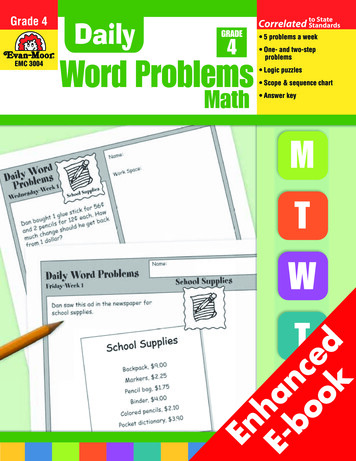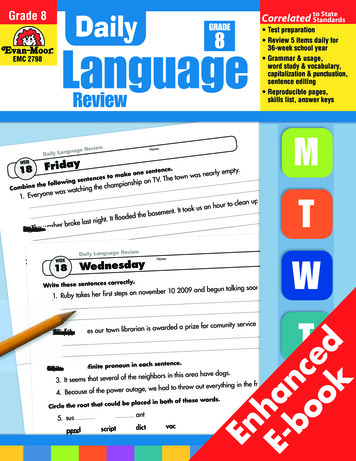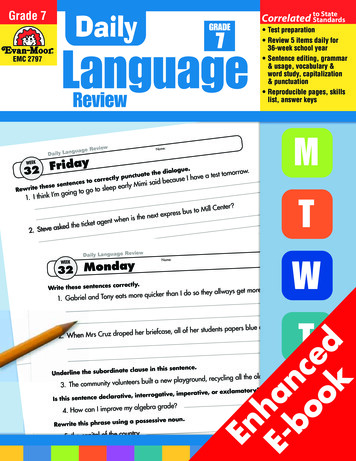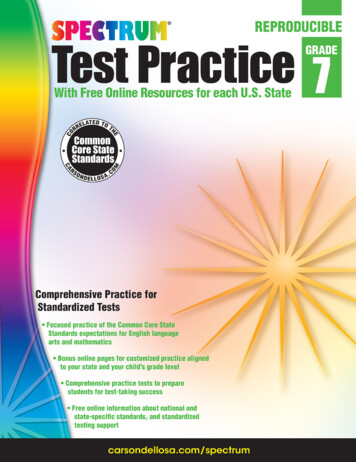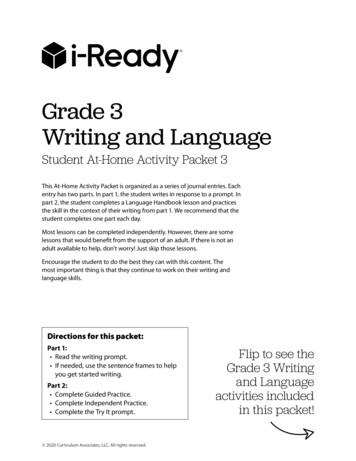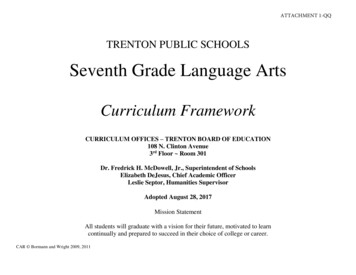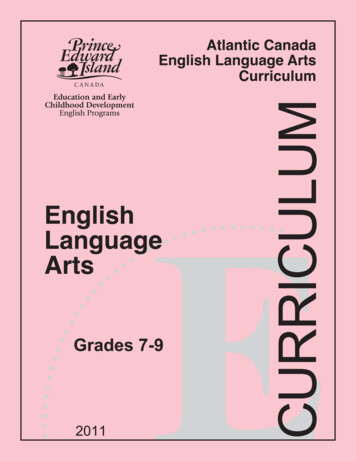
Transcription
lies in teaching them values that will serve them wellin the future.Grade 10 Teacher’s GuideI love working with children, and my greatest reward— Nomlungisi Dlelembe, Teacher1. The series was written to be aligned with CAPS. See page x to see how CAPS requirements are met.2. A possible teaching plan has been included. See page x to see how much time this could save you.3. Each topic starts with an overview of what is taught, and the resources you need. See page 2 to find out how this willhelp with your planning.4. There is advice on pace-setting to assist you in completing all the work for the year on time. Page 28 shows you how thisis done.5. Advice on how to introduce concepts and scaffold learning is given for every topic. See page 49 for an example.6. All the answers have been given to save you time doing the exercises yourself. See page 53 for an example.7. Also included is a CD filled with resources to assist you in your teaching and assessment. See the inside front cover.The accompanying Learner’s Book is written in accessible language and contains all the content your learners need to master.The exciting design and layout will keep their interest and make teaching a pleasure for you.We would love to hear your feedback. Why not tell us how it’s going by emailing us at english@viaafrika.com? Alternatively,visit our teacher forum at www.viaafrika.com.Language: Englishwww.viaafrika.comGrade 10 Study GuideA.L. Smith, P.J. Tsilik, J.M. van Heerden, P.M. Msibi, L.M. DamonsVia Afrika English First Additional LanguageVia Afrika understands, values and supports your role as a teacher. You have the most important job in education, and werealise that your responsibilities involve far more than just teaching. We have done our utmost to save you time and makeyour life easier, and we are very proud to be able to help you teach this subject successfully. Here are just some of the thingswe have done to assist you in this brand-new course:Via AfrikaEnglish FirstAdditional Language
A.L. SmithhS t u d y GuG ideEnglis h Fi rst AddiA itionn alLannguaageG rade 101ISBN: 978-1-41546-312-3
ContentsSection 1 Listening and speaking . 6Overview . 6Unit 1 Listening . 7Unit 2 Speaking – Informal speaking skills . 8Unit 3 Speaking – Formal speaking skills . 9Unit 4 How are listening and speaking assessed? . 17Opportunities to practise listening and speaking . 19Section 2 Reading and viewing . 22Overview . 23Unit 1 Literary texts . 23Unit 2 Non-literary texts . 29Unit 3 Critical Language Awareness . 39Unit 4 How are reading and viewing assessed? . 43Opportunities to practise reading and viewing skills . 45Section 3 Writing and presenting . 46Overview . 46Unit 1 Getting started . 47Unit 2 Writing paragraphs . 49Unit 3 Essays. 51Unit 4 Longer transactional writing . 54Unit 5 Shorter transactional writing . 56Unit 6 Other writing . 62Unit 7 How are writing and presenting assessed? . 64Opportunities to practise writing and presenting . 70 Via Afrika ›› English First Additional Language2
Section 4 Language structures and conventions. 79Overview . 79Unit 1 Words. 80Unit 2 Phrases, clauses and sentences . 95Unit 3 Punctuation . 100Unit 4 Direct and indirect speech . 103Unit 5 More about language . 105Unit 6 How are language structures and conventions assessed? . 107Opportunities to practise language structures and conventions . 107Section 5 Exam papers .108Paper 1 Language in Context .108Paper 3 Writing . 118Section 6 Answers to exam papers . 122Paper 1 Language in Context . 122Paper 3 Writing . 129 Via Afrika ›› English First Additional Language3
Introduction to English First Additional LanguageLearning an additional language can often feel like hard work. It does not have to be.All you need to do is treat it like any other skill that you are good at: learn how to useit, and then practise.We hope that you will use this Study Guide to develop your language skills in all theskill areas – Listening and speaking, Reading and viewing, and Writing. Of course,when you learn a language you need to know something about the way it works. Thesection on language structures and conventions will give you all the information youneed. In the final section of this Study Guide you will find some completeexamination papers to help you check that you are on top of everything.Enjoy developing this important skill!Assessment in Grade 10You will be assessed informally and formally throughout the year. You will complete12 Tasks. Two of these tasks are made up of the mid-year and final exams. Each of thetasks will be discussed in the relevant sections in this Study Guide. The structure ofthe exams is as follows:PAPER 1 LANGUAGE IN CONTEXT2 hoursMarks: 80Section A: Comprehension (30 marks)Section B: Summary (10 marks)Section C: Language (40 marks)PAPER 2 LITERATURE2 hoursMarks: 70 Via Afrika ›› English First Additional Language4
PAPER 3 WRITING2 hoursMarks: 100A: Essay – One essay (50 marks)B: One text – Longer Transactional text (30 marks)C: One text – Shorter Transactional text (20 marks)PAPER 4 ORALSReading Prepared reading (20 marks)Speaking: Prepared speech (20 marks)Listening (10 marks) Via Afrika ›› English First Additional Language5
SECTION1Listening and speakingOverviewDuring your Grade 10 year, you are going to need to develop your listening andspeaking skills. Listening is vitally important in everyday life, and also very importantat school. Not only does listening allow you to develop your language skills further, itis also one of the most important ways that you learn new things in all your subjects.You will need to develop the skills to: listen for specific information listen for critical analysis and evaluation listen for information so that you can interact with others listen for appreciation.You will be able to test that you have listened well by answering questions correctly,checking that the notes you have taken are accurate, and seeing if you have been ableto use information to do things like label diagrams or summarise what you haveheard. Sometimes you will need to come to a conclusion based on what you haveheard, or you might have to evaluate information critically. Your listening skills willbe assessed in a number of ways, but one of the important methods your teacher willuse is the listening comprehension.When we interact with someone who is speaking to us, we often have to speak tothem in return. In Grade 10, you are going to develop a number of informal and formalspeaking skills.To develop your informal speaking skills, you will take part in conversations,dialogues, discussions in group work and do some unprepared reading aloud.You will also learn how to speak in formal situations like interviews, paneldiscussions, debates and official events. Via Afrika ›› English First Additional Language6
UNIT1ListeningListening comprehensionA listening comprehension aims to assess how well you listen to a text. You areexpected to listen carefully and then answer questions on what you have heard. Youcould listen for a number of reasons.Listening to take notesHere you will listen for the main points and examples and make short notes in yourown words. You might also need to listen to information to transfer it to another form– for example, listen to a text and fill in a table, or complete a map.Listening criticallyThis could involve listening for: appreciation and then explaining why you liked or disliked it a viewpoint in a text, and then explaining it. You would pay attention to:o biaso prejudiceo attitudeo positionSome useful tips Focus your full attention on what you are hearing. Some learners find they areable to pay more attention when they close their eyes. Other learners like todoodle (draw or scribble aimlessly) while listening. Find out what helps you tolisten best. Pay attention to the content of what you are listening to, but don’t try tomemorise everything. Listen out for the main points. Write clear answers based on what you have heard – don’t make anything up. Via Afrika ›› English First Additional Language7
UNIT2Speaking – Informal speaking skillsWe develop our speaking skills whenever we speak. Use all the opportunities you aregiven in class to improve your skills.These opportunities include: discussions about topics in group work conversations and dialogues with other learners unprepared reading aloud. Via Afrika ›› English First Additional Language8
UNIT3Formal speaking skillsSpeechesSpeeches are presented on many different occasions ranging from school to church tosocial events. A well-prepared speech that is well presented is always highly thoughtof.Prepared speechA prepared formal speech is very similar to an essay. It requires you to present yourideas in a logical way. Prepared speeches are often based on careful research.Follow the same steps you would take when you are writing an essay (see Section3Writing for more), and take note of these important points.Structure Use an introduction that grabs the attention of your audience. Ask a question.Tell a short story that relates to your topic. Surprise your audience. In the body develop each of your ideas logically, making sure that each idea islinked to the next one. Be careful of being too serious, or of trying too hard tobe funny. Match your content to your audience. Your conclusion should sum up the ideas in your speech. Aim at leaving youraudience with something to think about.Language Make sure that you have identified who your audience is and use languagethat is appropriate to that audience. Always use formal language, but remember that you can choose the words youuse so that your ideas are easily understood (see Section 4 Languagestructures and conventions for more).Presentation Prepare and practise before your presentation. Pace yourself. Go more slowly during important points, and speed up whenyou are giving examples. Via Afrika ›› English First Additional Language9
UNIT 3Pause. Give your audience time to think about your important points.Pay attention to your posture. Stand up straight, shoulders back, feet slightlyapart so that you are comfortable, and don’t sway.Use gestures and facial expressions naturally.Make eye contact with your audience. It shows you are confident, and itmakes it easier to convince them of your point of view.Unprepared speechUnprepared or informal speeches usually happen on the spot and you do not havemuch time to prepare. Often you are asked to ‘say a few words’ at a function.Work hard to follow all the steps for a formal speech, but of course, you will not havetime to prepare and practise.Remember: to structure your speech carefullyto use language and that suits the audience and the occasionto present confidently.Reading aloudWe do not often get the chance to read aloud in public, but when someone readsaloud well, everyone is impressed. You, too, can impress others if you follow theseuseful hints.Some useful tips Choose your text carefully. Aim to read something that will be interesting forothers to hear. Because you will not have a long time, choose a passage thatmakes sense when it is taken from a longer piece. Make sure you understand the meaning of all the words – if you are uncertainof what a word means your audience will hear it in your voice. Make sure you understand what the text is about. You may have to answerquestions on it. Here again, if you don’t know what you are reading, you willnot be able to read confidently. Via Afrika ›› English First Additional Language10
UNIT 3Practise reading aloud so that you can:o make eye contact with your audienceo enhance meaning by using your voiceo project your voice clearly (speak loudly enough for everyone to hearwithout shouting, or hurting your voice)o use pace (speed of delivery) to express meaningo become confident and fluent in your delivery.Use hand gestures when it is appropriate to do so.Stand up tall, feet a little apart when you read. This confident posture will helpyou to read aloud easily.Pay attention to how you will be assessed in Unit 4 of this Section.InterviewThe aim of an interview is to get specific information or an expression of a point ofview from someone. We often think of job interviews, but politicians and famouspeople are often interviewed.Some useful tipsA good interviewer (the person who does the interviewing): prepares for the interview byo deciding what she or he wants from the interviewo planning questionso finding out a little about the interviewee (the person being interviewed) builds trust in the interview by listening carefully to what is being said listens to what is being said and responds to the interviewee asks questions that gather relevant information in a respectful way thanks the interviewee.The interviewer may wish to take notes during the interview. Via Afrika ›› English First Additional Language11
UNIT3Panel discussionThe aim of a panel discussion to is to share different opinions or information from avariety of difference sources. Each person on the panel is an expert in the field.A panel discussion has the following participants, and each participant has certainduties.ChairpersonThe chairperson must: introduce the topic of the panel discussion introduce the speakers manage time effectively keep order if panel members or members of the audience speak out of turn orfail to keep to time encourage participation from the audience call for a proposal or votes if appropriate.A good chairperson: prepares for the panel discussion remains neutral.Panel memberThe panel member must: keep to the topic participate in the discussion without trying to take it over follow the chairperson’s discussion.A good panel member: prepares for the panel discussion presents her or his point clearly and effectively does not become emotionally involved, especially if someone else disagreeswith her or his point of view. Via Afrika ›› English First Additional Language12
UNIT3Giving directions and instructionsDirectionsWhen you give directions, you are explaining to someone how to get from one placeto another. Your directions must be clear, brief and easy to follow.Some useful tips Think carefully before you speak. Go over the route carefully in your mind –try to see it. Be clear about the instructions. Refer to the specific direction and use wordslike left, right, straight ahead. Include landmarks that someone will easily recognize. For example, ‘Turnright at the statue of O.R. Tambo.' Include distances. You can either give approximate distances – about 100metres – or exact measurements – go for six blocks. Use the imperative form (commands). ‘Walk straight for seven blocks. Turnleft.’ Speak slowly. If possible, check that you listener understands. Repeat any directions thatyour listener is unsure of.InstructionsWe give instructions so that someone can complete a task. Use logical, step-by-steppoints that are brief and exact. Remember, the listener has to know exactly what todo.Some useful tips Think carefully about what has to be done. Be sure to get all the steps in theright order. Describe all the things that you need. Speak slowly. Be precise and use the appropriate vocabulary and technical language. Use words like first, second, next, then to order the instructions. Via Afrika ›› English First Additional Language13
UNIT 3Include all necessary details, but don’t add in too much or you will confuseyour listener.If possible, check that you listener understands. Repeat any instruction thatyour listener is unsure of.DebatingA debate is a formal event in which two teams explain their viewpoints on a motion (aformal proposal on a specific topic) and try to convince each other and their audiencethat they have the stronger argument. The audience gets involved in the debate.Who is involved?Two teams, a chairperson and the floor (the audience) make up a debate, and eachhas a particular role to play.The chairpersonThe chairperson will: introduce the motion and perhaps give some background to it introduce each speaker in the correct order (see the procedure below) manage the time of each speaker manage the discussion when the debate is opened to the floor (the audience) call for a vote (if appropriate) end the debate. Via Afrika ›› English First Additional Language14
UNIT3The debating teamsFirst speakerThe Proposing team presents argumentsThe Opposing team presents argumentssupporting the motion.opposing the motion.introduces the Proposer’s arguments.introduces the opposing argument, rebuts(disproves or argues against) the Firstspeaker.Second speakerbuilds on the team’s argument,presents new arguments, and rebuts thepoints made by the opposing team’s Firstbuilds on the team’s arguments,presents new arguments, and rebuts theprevious speaker’s points.speakerThird speakerrepeats the team’s main arguments andtries to persuade the floor to vote for themotion and gives reasons for this.The third speaker may also rebut previousarguments.repeats the team’s main arguments andtries to persuade the floor to vote againstthe motion and gives reasons for this.The third speaker may also rebut previousarguments.The floorThe audience or floor listens to both sides of the argument. Floor members may askquestions or provide comment at the appropriate time.If allowed, the floor will be able to vote ‘For’ or ‘Against’ the motion at the end of thedebate.What is the procedure?A particular order is followed:1. First speaker for the proposition2. First speaker for the opposition3. The second speaker for the proposition4. The second speaker for the opposition5. The Chairperson opens the motion to the floor for discussion and questions.6. Third speaker for the opposition7. The third speaker for the proposition8. The debate is concluded and a result obtained by audience vote when themotion is put to the vote, or by a judge. Via Afrika ›› English First Additional Language15
UNIT3Introducing someoneWe often have to introduce someone to an audience. This could be the guest ofhonour or someone who is going to make a speech. The aim is to give your audienceinformation about the person.Some useful tips Talk to the person before you have to introduce her or him. Find outsomething interesting about this person – a personal story, something she orhe is proud of – anything that you can use to create interest when youintroduce her or him. Find out about all the person's achievements. Be formal when you introduce the person. Pay attention to your register andvocabulary. Do not make fun of the person or make a joke at her or his expense. Be brief and to the point, but make sure that you have given your audienceenough information. Create interest with the interesting information you have learned. Use your voice and pace to create and maintain interest. Conclude confidently. Via Afrika ›› English First Additional Language16
UNIT4How are listening and speaking assessed?You will complete three formal speaking and listening tasks in Grade 10.Term 1 – Task 1: Listening ComprehensionTerm 2 – Task 5: Formal researched speechTerm 3 – Task 9: Prepared readingYou will also be assessed informally.How am I assessed?Reading: Prepared readingThis is for 20 marks.Your teacher will assess you according to: your understanding of the text how you convey meaning using your voice how well you read (your reading skills) how you use gestures, body language and facial expression how you answer questions on what you read how effectively you interpret the text your choice of text how well you prepared for the reading how much audience eye contact you make. Via Afrika ›› English First Additional Language17
UNIT4Speaking: Prepared speechThis is for 20 marks.Your teacher will assess: the quality of your research skills how well you planned and organized your speech your presentation skillso use of voice and toneo use of gestures, body language and facial expressiono awareness of your audienceo your audience eye contact your language use your choice, design and use of audio and/or audio-visual aids.ListeningThis is for 10 marks.Your teacher will assess: your comprehension of the text your evaluation of the content. Via Afrika ›› English First Additional Language18
Opportunities to practicelistening and speaking1. Listen to a radio news broadcast and take down the main points. If possible,record the news broadcast so that you can compare your notes to the fullbroadcast, or listen to the next broadcast and see if you got all the importantpoints. (Listen for information.)2. A learner from another school in another province has joined your class for theday. Introduce him or her to the rest of the class. (Introduce someone.)3. Watch a television talk show with a friend. Listen carefully for the speakers’points of view. Compare notes with your friend. Were you able to identify thespeakers’ opinions? (Listen for opinion.)4. You have been asked to talk to the Grade 8s about how wonderful literature is.Select one favourite literary text (it can be a poem, a novel, a short story or aplay that you have read) and tell them what you think of it and why. (Giveopinion on a literary text)5. Choose a photograph from a magazine. Write a short speech in which you saywhether you like the photograph or not, and why. (Give opinions.).6. Listen to a popular song. Talk to a friend about it. Do you like it? What appealsto you about the song? Or why don’t you like it? Do you find it meaningful toyou? (Give opinions.)7. Look carefully at the following visual text and explain it to a friend. Via Afrika ›› English First Additional Language19
OPPORTUNITIES TO PRACTICE LISTENING AND SPEAKINGPocket moneyTransport 40%Lunch 15%Savings 10%Air time 35%8. Prepare and present a formal speech on one of these following topics:a. Folktales are nonsense.b. My favourite folktale or myth (don’t just tell the story!)c. Ways to improve our school9. Select a passage from a book or magazine or newspaper article and read italoud to an audience (your family, social or church group).10. Share a joke with a group of friends.11. With a group of friends prepare and hold a panel discussion on one of thefollowing topics:a. Ways to improve our communityb. The importance of educationc. Teenage pregnancy Via Afrika ›› English First Additional Language20
OPPORTUNITIES TO PRACTICE LISTENING AND SPEAKING12. Prepare and present one of the following debates with some friends:a. Learners should not be allowed to do part-time work after school.b. Single-sex schools are the best places in which to learn.c. Everyone should get a university education.13. Give instructions to a learner in Grade 5 on how to cover a school textbook inplastic.14. An aunt you have not seen in a while has phoned to say she is coming to visit.Give her directions from the main road to your house. Via Afrika ›› English First Additional Language21
SECTION2Reading and viewingOverviewThe texts that are read in this part of the curriculum can be divided into two sections– literary texts and non-literary texts. The literary texts are the texts that we think ofas literature: novels, short stories, plays and poetry.The non-literary texts are made up of a number of different types of texts such as: informative texts like newspaper articles, magazines, editorials, speeches, among othersvisual texts like graphs, diagrams, photographs, films, cartoons, comic strips,illustrations, and advertisements etccomputer technology texts like emails, SMS texts and twitter messages ortweets.In this Study Guide we will examine these different types of texts and how to studythem. We will also develop our skills in Critical Language Awareness by looking attexts that have a particular purpose or agenda and will ask, ‘Who gains from this text?Who loses? How?’ Via Afrika ›› English First Additional Language22
UNIT1Literary textsTypes of literary textWhen we study literature, we study four major types or genres of text:1. poems2. short stories3. novels4. drama (plays).Defining poetryA poem is a word composition by a poet that is often characterised by rhythm, vividlanguage and imagery and emotion. There are a number of forms of poetry – sonnets,odes, haiku etc. Each form adds something to the poem and so is carefully chosen bythe poet. Poets use poetic devices to help create the poem.Defining a short storyA short story is a short piece of prose that is written from a particular narrative (storytelling) point of view. Short stories are fictional although they may be based on a realevent. There is (most often) a plot, characters and some development of themes in thestory.Defining a novelA novel can be defined as an extended or long piece of prose. Usually there is a plotand there are characters in a novel. Whereas in a short story the author does not havethe time to develop the plot or to introduce sub-plots, or to develop the characters, thelength of a novel allows for this. Often there are sub-plots that run at the same time asthe main plot. Characters in novels can be developed in greater depth, and there areoften many more themes than in a short story. Via Afrika ›› English First Additional Language23
UNIT1Defining dramaWhile they still tell a story, plays (drama) are written in a very different way to shortstories or novels.A play provides us with the actual words that the characters are saying in directspeech, and some stage directions. There are no descriptions of what is going on orwhat anyone is thinking nor are there explanations from the playwright. Everythingwe learn about the character and the action we find in the characters’ words or in thestage directions. We learn about characters from what they say, what others say aboutthem and what we see them do.The characters’ words are set apart from each other. The character’s name is set onthe left of the page, and her or her words are indicated next to the name.The playwright indicates what must happen by giving stage directions. These areoften in italics. The playwright will sometimes indicate the time and setting of theplay, as well as the scenery on the stage.Plays are divided into acts and scenes.Important features of literary textsA literary text has a great deal to offer us as readers. In order to experience all that wecan from a piece of literature, it is important to understand some basic concepts thatwe use to study literature.PlotThe plot is the action of the story – what happens, when and to whom.The plot often follows a particular pattern: set-up – the start of the story when we are introduced to the characters and settingrising action – further on into the story – the movement towards the climax Via Afrika ›› English First Additional Language24
UNIT 1the climax – the peak of the action when the conflict between characters,characters and nature or other circumstances has reached breaking pointfalling-action – the part after the story where things are resolved in one way oranother and the story com
Unprepared speech Unprepared or informal speeches usually happen on the spot and you do not have much time to prepare. Often you are asked to ‘say a few words’ at a function. Work hard to follow all the steps for a formal speech, but of course, you will not have time to prepare and practise. Rememb
